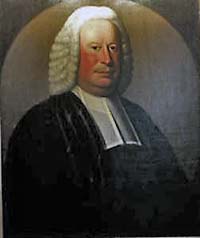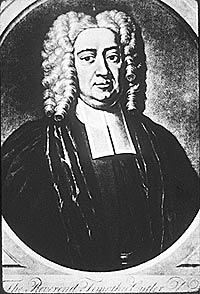Readings:
Psalm 32:8-12
Sirach 24:1-8
1 Peter 2:1-10
Matthew 16:13-20Preface of Advent
PRAYER (traditional language)
God of a pilgrim people, who didst call Samuel Johnson, Timothy Cutler and Thomas Chandler to leave their spiritual home and embrace the Anglican way: We give thee thanks for their devoted service in building up thy Church and shepherding thy flock in colonial times; and we pray that, like them, we may follow where thy Spirit leads and be ever eager to feed the hearts and minds of those entrusted to our care, in the Name of Jesus Christ; who livest and reignest with thee and the Holy Spirit, one God, now and for ever. Amen.
PRAYER (contemporary language)
God of your pilgrim people, you called Samuel Johnson, Timothy Cutler and Thomas Chandler to leave their spiritual home and embrace the Anglican way: We give you thanks for their devoted service in building up your Church and shepherding your flock in colonial times; and we pray that, like them, we may follow where your Spirit leads and be ever eager to feed the hearts and minds of those entrusted to our care, in the Name of Jesus Christ; who lives and reigns with you and the Holy Spirit, one God, now and for
ever. Amen.
This commemoration appears in A Great Cloud of Witnesses.
Return to Lectionary Home Page
Webmaster: Charles Wohlers
Last updated: 14 Oct. 2018
SAMUEL JOHNSON,
TIMOTHY CUTLER, &
THOMAS BRADBURY CHANDLER
PRIESTS, 1772, 1765, 1790
 The Reverend Doctor Samuel Johnson (14 October 1696 – 6 January 1772) was a clergyman, educator, and philosopher in colonial British North America. He was a major proponent of both Anglicanism and the philosophy of George Berkeley in the colonies, and served as the first president of King's College (the predecessor to today's Columbia University).
The Reverend Doctor Samuel Johnson (14 October 1696 – 6 January 1772) was a clergyman, educator, and philosopher in colonial British North America. He was a major proponent of both Anglicanism and the philosophy of George Berkeley in the colonies, and served as the first president of King's College (the predecessor to today's Columbia University).
Born in Guilford, Connecticut, he graduated from Yale College in 1716. Johnson first became Congregationalist minister of a church in West Haven, but influenced by the writings of John Locke and Isaac Newton, he and a group of other Collegiate School graduates began to express doubt in the legitimacy of their Congregational ordination. As a result, Johnson left the colony in order to seek ordination in the Church of England. Upon his return to Connecticut, he opened the first Anglican church in the colony at Stratford in 1724 and strenuously polemicized, under the auspices of the Society for the Propagation of the Gospel in Foreign Parts, against both the Congregationalists of New England and the new evangelical outburst occasioned by popular preacher George Whitefield and the Great Awakening he unleashed.
He remained in Stratford until 1754, when the vestrymen of the Anglican Trinity Church in New York City considered him the logical choice to serve as after the first president of King's College. Though reluctant to leave his family in Connecticut, Johnson ultimately took up the post, assisting in behind-the-scenes maneuverings to ensure the college would be explicitly Anglican, rather than nonsectarian. In the early years of the institution, Johnson was the sole instructor, primarily teaching classics and philosophy. Owing to his fear of smallpox, Johnson was frequently absent from the city, and increasingly shared his teaching responsibilities. When his wife died of smallpox, Johnson began to seek a means to leave his post. In 1763 he returned to his ministry at Stratford, where he died.
Johnson was among the few colonial Americans whose cultural and intellectual achievements garnered notice in Great Britain. He was a friend of and often corresponded with the Irish philosopher George Berkeley, and became the chief promoter of his philosophy of immaterialism in colonial America. In 1731 Johnson published his Elementa Philosophica (Eng. Compendium of Logic and Metaphysics), and in 1746 his Ethica (Eng. System of Morality).
(more at Wikipedia)
 Rev. Timothy Cutler |
Timothy Cutler (May 31, 1684 – August 17, 1765) was an American Episcopal clergyman and rector of Yale College. Cutler was born in Charlestown, Massachusetts, graduated from Harvard College, and on January 11, 1709/10, having come from Massachusetts to Connecticut with the recommendation of being "one of the best preachers both colonies afforded", he was ordained pastor of the Congregational Church in Stratford. Cutler served his parish acceptably until March 1718/19 when, conditions at Yale College calling imperatively for a resident rector, he undertook that office at the request of the trustees. The new rectorship opened auspiciously and an era of prosperity seemed at hand when, on September 13, 1722, the rector, with Tutor Daniel Browne and several Congregational clergymen, met with the trustees, declared themselves doubtful of the validity of their ordination, and asked advice with regard to entering the Church of England. On October 17, the trustees voted to "excuse the Rev. Mr. Cutler from all further services as Rector of Yale College".
After a visit to London, where he was ordained, with Samuel Johnson, by the Bishop of Norwich in March 1723, Cutler became rector of the newly formed Christ Church, Boston (more familiarly known as Old North Church). Here he remained until his death, one of the leading Episcopal clergymen of New England, full of polemic spirit, venerated for his learning, but too haughty in manner to be popular. He never ceased to urge the appointment of a bishop for the American colonies. With the exception of four sermons, two preached before the Connecticut General Assembly, May 9, 1717, and Oct. 18, 1719, he left no published works.
(more at Wikipedia)
Thomas Bradbury Chandler (26 April, 1726 - 17 June, 1790) was an Anglican clergyman serving in New Jersey - 43 years as rector of St. John's, Elizabeth. He was a pupil of Samuel Johnson (see above) and was involved in the promotion of the Church of England in America prior to the Revolution; his major work is An Appeal to the Public, in behalf of the Church of England in America. Like Samuel Johnson, he was a strong opponent of evangelical fervor, such as that expressed by George Whitefield. A strong Loyalist, he fled to England in 1775, but returned to the U. S. in 1785.
(more at famousamericans.net)